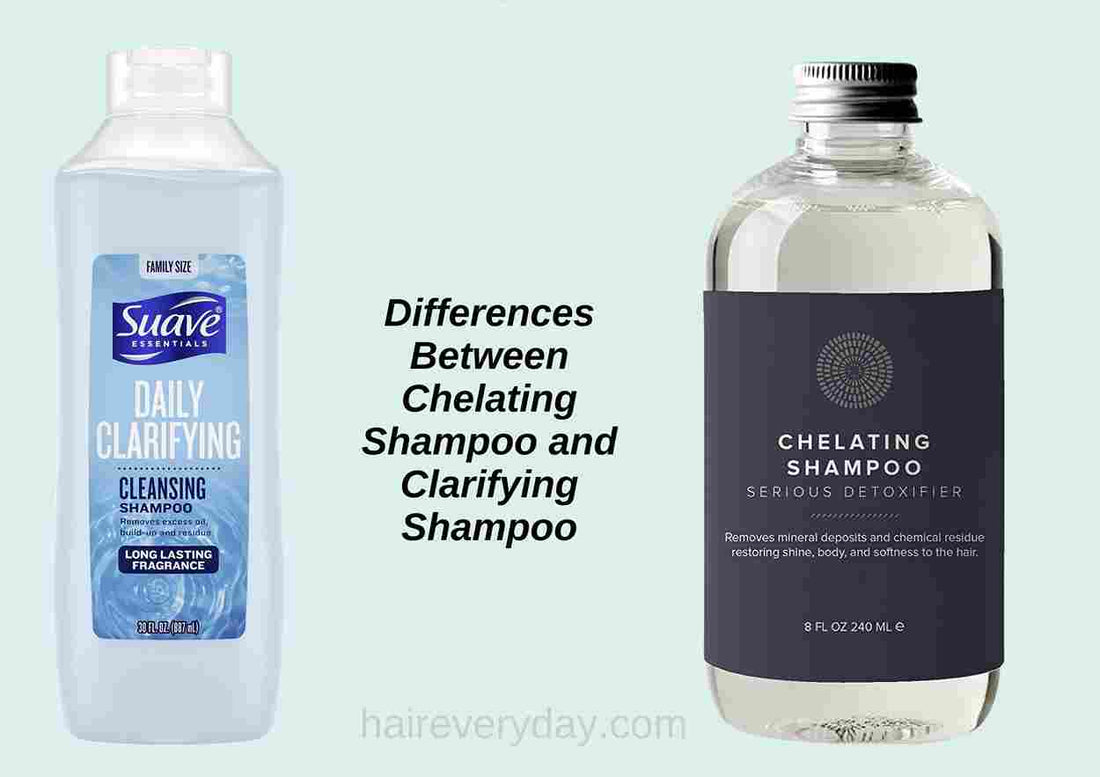Chelating Shampoo Vs Clarifying Shampoo: let’s discuss the top differences between these and how they remove metal buildup, chemicals and minerals from hair strands.
As someone who’s always been particular about hair care, I’ve often found myself navigating the vast world of hair products to maintain the health and vibrancy of my locks.
Two types of shampoos that have frequently piqued my interest are chelating and clarifying shampoos. They both promise to cleanse your hair, but they serve different purposes and come with their own set of pros and cons.
In my guide, I’ll take you through the top 10 differences between chelating and clarifying shampoos and help you understand when and why to use each one. Let’s dive in!
Chelating Shampoo vs Clarifying Shampoo
| Feature | Chelating Shampoo | Clarifying Shampoo |
|---|---|---|
| Purpose | Removes hard water mineral buildup, chlorine, and metals | Eliminates excess oil, product buildup, and impurities |
| Usage | Ideal for swimmers or those with hard water exposure | Suitable for all, especially those using heavy styling products |
| Key Ingredients | Chelating agents like EDTA or phytic acid | Surfactants like sulfates for deep cleansing |
| Frequency of Use | Use occasionally, as needed | Use occasionally, as needed (once a week or less) |
| Hair Type | Beneficial for all hair types, especially chemically treated or frequently exposed to hard water | Especially useful for oily hair or those with heavy product use |
| Effect on Hair | Prevents discoloration and dullness, maintains hair health | Restores hair’s natural shine and volume |
| pH Level | Often formulated with a balanced pH to protect hair | May have a higher pH to open hair cuticles for cleansing |
| Post-Use Treatment | Typically followed by a moisturizing conditioner | Often followed by a hydrating treatment to restore moisture |
| Availability | Available at salons and specialized stores | Widely available in drugstores and beauty stores |
1. Purpose:
– Chelating Shampoo: Chelating shampoos are specifically designed to remove mineral buildup from hard water, well water, or swimming pool water. They work by binding to the minerals and pulling them out of your hair.
– Clarifying Shampoo: Clarifying shampoos are intended to remove product buildup, excess oils, and residues from styling products and environmental pollutants.
2. Ingredients:
– Chelating Shampoo: Chelating shampoos often contain ingredients like ethylenediaminetetraacetic acid (EDTA) or citric acid, which are effective at breaking down mineral deposits.
– Clarifying Shampoo: Clarifying shampoos typically contain surfactants and strong cleansing agents to dissolve product buildup and residue.

3. Frequency of Use:
– Chelating Shampoo: Chelating shampoos are not meant for regular use and should only be used when you encounter hard water or mineral buildup issues. Frequent use can be harsh on your hair.
– Clarifying Shampoo: Clarifying shampoos can be used more frequently, but it’s still advisable not to use them every day. They are best used as needed, usually once a week or every two weeks.
4. Hair Type:
– Chelating Shampoo: Chelating shampoos are especially useful for individuals with hard water-related concerns. They may not be necessary for those with soft water or normal water sources.
– Clarifying Shampoo: Clarifying shampoos are suitable for all hair types and can benefit anyone looking to remove product buildup or residues.
5. Color-Treated Hair:
– Chelating Shampoo: Chelating shampoos may not be the best choice for color-treated hair as they can strip away color molecules, leading to fading.
– Clarifying Shampoo: Some clarifying shampoos are formulated to be color-safe, but it’s essential to check the product label. Using a non-color-safe clarifying shampoo can lead to color fading.
6. Conditioning:
– Chelating Shampoo: Chelating shampoos are not typically known for their conditioning properties and may leave your hair feeling slightly stripped.
– Clarifying Shampoo: Some clarifying shampoos include conditioning agents to balance the cleansing effect, leaving your hair softer and more manageable.
7. Hair Health:
– Chelating Shampoo: Chelating shampoos are essential for maintaining hair health in areas with hard water, as mineral buildup can lead to dryness, brittleness, and dullness.
– Clarifying Shampoo: Clarifying shampoos can help improve hair health by removing product buildup that can weigh down your hair and make it look lifeless.
8. Effect on Styling:
– Chelating Shampoo: Using a chelating shampoo can help your hair hold styles better by eliminating mineral deposits that can interfere with styling products.
– Clarifying Shampoo: Clarifying shampoos can make your hair more receptive to styling products, ensuring they work effectively.

9. Use Before Special Treatments:
– Chelating Shampoo: It’s advisable to use a chelating shampoo before chemical treatments, such as perms or relaxers, as it ensures that your hair is free from mineral deposits that can interfere with the treatment’s results.
– Clarifying Shampoo: Clarifying shampoos are also used before special treatments to create a clean canvas for coloring or chemical processes.
10. Fragrance:
– Chelating Shampoo: Chelating shampoos often have a milder, less fragrant scent compared to clarifying shampoos.
– Clarifying Shampoo: Clarifying shampoos may have stronger scents due to the inclusion of fragrance ingredients.
When Do I Use a Chelating Shampoo on Hair?
Chelating shampoos are specifically designed to combat hard water issues. Here are some scenarios when you might consider using a chelating shampoo:
1. Hard Water Problems: If you live in an area with hard water, you may notice mineral buildup in your hair over time. This can lead to dryness, frizz, and dullness. A chelating shampoo can help remove these mineral deposits.
2. After Swimming: If you spend time in pools, especially chlorinated pools, or swim in well water, chelating shampoo can help eliminate the chlorine or mineral buildup that can affect your hair.
3. Before Chemical Treatments: If you’re planning to undergo chemical hair treatments like perms, relaxers, or coloring, using a chelating shampoo beforehand ensures that your hair is free from mineral interference.

When Do I Use a Clarifying Shampoo on Hair?
Clarifying shampoos are versatile and can be used in various situations. Here are some instances when a clarifying shampoo may be beneficial:
1. Product Buildup: If you use styling products regularly, such as hairspray, gels, or serums, you may experience product buildup. A clarifying shampoo can effectively remove this buildup, restoring your hair’s natural texture and shine.
2. Oil and Grease: If you have oily hair or a greasy scalp, a clarifying shampoo can help remove excess oil and leave your hair feeling clean and fresh.
3. Swimming Pool Chlorine: After a day at the pool, chlorine can leave your hair feeling dry and damaged. A clarifying shampoo can remove chlorine residue and help maintain hair health.
4. Environmental Pollutants: Exposure to pollutants and environmental factors can also lead to hair dullness. Using a clarifying shampoo can cleanse your hair and restore its luster.
The Advantages of Using a Clarifying Shampoo
Using a clarifying shampoo comes with several benefits:
1. Effective Product Removal: Clarifying shampoos are highly efficient at removing product buildup, excess oils, and residues from the hair.
2. Improved Hair Health: By removing pollutants and impurities, clarifying shampoos can help improve the overall health and appearance of your hair.
3. Enhanced Styling: Clean hair is more receptive to styling products, ensuring that they work effectively and hold styles better.
4. Versatility: Clarifying shampoos can be used by individuals with various hair types and concerns.
The Disadvantages of Using a Clarifying Shampoo
However, there are some downsides to using clarifying shampoos:
1. Color Fading: Some clarifying shampoos can strip away color molecules from color-treated hair, leading to premature color fading.
2. Potential Dryness: Clarifying shampoos can be drying to some hair types, especially if used too frequently.
3. Fragrance Sensitivity: The strong fragrances in some clarifying shampoos may not be suitable for individuals with fragrance sensitivities or allergies.
The Advantages of Using a Chelating Shampoo
Chelating shampoos offer unique advantages, particularly in areas with hard water:
1. Mineral Deposit Removal: Chelating shampoos effectively remove mineral buildup caused by hard water, well water, or swimming pool water.
2. Hair Health: By eliminating mineral deposits, chelating shampoos help maintain the health and appearance of your hair, preventing issues like dryness and dullness.
3. Enhanced Styling: Clean, mineral-free hair is better for styling, as it can hold styles more effectively.

The Disadvantages of Using a Chelating Shampoo
However, there are some downsides to using chelating shampoos:
1. Color Fading: Chelating shampoos can strip color molecules from color-treated hair, leading to premature color fading. They are not recommended for color-treated hair.
2. Not for Regular Use: Chelating shampoos should not be used regularly and are best reserved for specific situations, as frequent use can be harsh on the hair.
3. Minimal Conditioning: Chelating shampoos may not leave your hair feeling as soft and conditioned as other shampoos.

Frequently Asked Questions
How Many Times in a Week Can You Use a Chelating Shampoo?
The frequency of using a chelating shampoo depends on your specific situation. In areas with extremely hard water, you might need to use it more often, perhaps once a week or as needed.
However, for most people, using a chelating shampoo every few weeks or on an as-needed basis is sufficient. Using it too frequently can be harsh on your hair, so moderation is key.
How Many Times in a Week Can You Use a Clarifying Shampoo?
Clarifying shampoos can be used more frequently than chelating shampoos but should still be used in moderation. Using a clarifying shampoo once a week or every two weeks is typically sufficient for most individuals.
However, if you have extremely oily hair or use a lot of styling products, you might use it more often, but be cautious not to overdo it, as excessive use can strip your hair of natural oils.
Will Chelating Shampoo Work on Hard Water Damage on Hair?
Yes, chelating shampoo is designed specifically to address hard water damage on hair. Hard water contains high levels of minerals like calcium and magnesium, which can build up on your hair over time, leading to dryness, brittleness, and dullness.
Chelating shampoos contain ingredients that bind to these minerals and effectively remove them from your hair, restoring its health and vitality.
Can I Use Chelating Shampoo for Natural Hair?
Yes, chelating shampoo can be used on natural hair, but it’s essential to be mindful of the frequency of use. Even natural hair can be affected by mineral buildup from hard water, so using a chelating shampoo as needed can help maintain the health and appearance of your natural hair.
Just remember not to overdo it, as excessive use can be drying. Additionally, if you have color-treated natural hair, you should be cautious, as chelating shampoos can cause color fading. Consider using a color-safe chelating shampoo if necessary.
In conclusion, understanding the differences between chelating and clarifying shampoos is crucial for maintaining healthy and vibrant hair.
Chelating shampoos are your go-to solution for hard water issues, while clarifying shampoos effectively remove product buildup and environmental pollutants.
By knowing when and why to use each type of shampoo, you can make informed choices about your hair care routine, ensuring that your locks remain fresh, clean, and beautiful.
Why You Should Trust Haireveryday?
The author of this article, Leah Marie Priest has a degree in Cosmetology with years of experience in dealing with hair care, scalp care, and hairstyling. As someone who extensively deals with all kinds of hair textures, products, styling methods and more, hair Leah Marie knows what kind of products and procedures suit each hair type and person. We have also tested these hair products and processes ourselves to provide you an unbiased review about every product. Each of our articles are also reviewed by a team of medical professionals so that you get the most accurate and expert-reviewed information.
Also Read:
Differences Between Scalp Scaler And Shampoo
Dry Shampoo Vs Dry Conditioner
To Summarize

